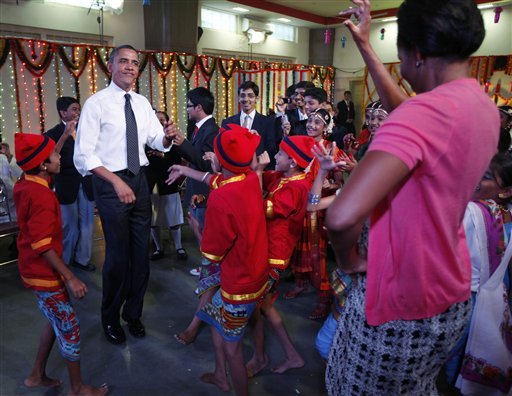 American President Barack Obama will be landing in New Delhi in next few hours. This is a historic visit because for the first time in the history of American history, its President will be staying outdoor out of the American soil for more than two hours. It is also significant for the new bilateral trade, military, scientific and human development co-operation between the two nations.
American President Barack Obama will be landing in New Delhi in next few hours. This is a historic visit because for the first time in the history of American history, its President will be staying outdoor out of the American soil for more than two hours. It is also significant for the new bilateral trade, military, scientific and human development co-operation between the two nations.Although this trip of Obama is much hyped one needs to explore in deep and detail to describe the future relations between the two vital democracies of the world. Many analysts and self styled foreign policy experts may offer wide range of menu for the decision makers. But the following can be considered for the forward movement of India and USA.
1. Work out a genuine model of bilateral co-operation
2. Keep national and global interests in mind
3. Stop issuing threats of kicking out Indian immigrants from USA
4. Ensure the ecological safety in framing development policies
5. Stop spying Indian government and citizens
6. Exchange the best of human resources
7. Help India to grow for the universal development
8. Agree to end terrorism
9. Rein in Pakistan to weed out terrorists from its soil. Take India along in this mission
10. Give the best of everything and take the best of India
Krishna Srivatsa writes in The Times of India on 23 January 2015
What happens when the world’s biggest democracy and the world’s most powerful democracy come together? Is the resultant embrace genuine bonhomie or the squeeze of death? As President Obama touches down on India there are several things Prime Minister Modi can ask for, and better still hope to get at least some of.
India’s overall strategy vis-a-vis the United States must change a little. India needs to get out of its British roots, where we believe if something is given to one country or one group, then another country or group becomes automatically eligible for it. The US instead is a tale of Washington’s fabled ‘K Street’, home to all the major lobbyists and advocacy groups of America whose complex interplay determines the final vector of forces.
Thus India needs to step up to the table and articulate what it wants, for that’s the way the US system responds. A potent example of that is how over the years Nasscom has engaged powerful lobbying firms to liaise with the US administration on visas and other issues, with reasonably good success till the recent immigration problems cropped up.
For business visitors from India, immigration queues in American airports are often a nightmare. The US has offered advance immigration facilities in Abu Dhabi and it would be convenient if the same can be extended to Mumbai and Bangalore — helping frequent flyers from the corporate and especially IT sectors a great deal. The US offered it to other countries such as Ireland in the past and India can easily seek and secure this benefit.
That apart establishment of a US consulate in Bangalore, India’s Silicon Valley, will be a good signal to an industry which sends thousands to the US every year.
Second, recent research by the Peterson Institute of International Economics argues that the economic value of Indian migrants in America is close to $50 billion per annum, significantly higher compared to US imports of services of $19 billion and goods of $41 billion. To leverage the complete value of Indian immigrants in America the proposed ‘totalisation agreement’ — which will essentially help those who spend their working lives across the two countries by protecting their benefits and removing legal obstacles from receiving them in another country — needs to be fast tracked.
Third, US goods and services trade with India touched $100 billion in 2013-14 with India being America’s 18th largest goods export market and 10th largest goods import market. Whereas the US is India’s second largest export market after EU. In general, the US has been less open than is believed and needs to liberalise its trade regime more.
Government of India statistics show that between 2000-13, US equity inflows were just 6% of $314,902 million total FDI inflow into India. While there is talk of bilateral investment and trade treaties what must be borne in mind is, if we go ahead, the US will almost certainly ask for opening up FDI in multi-brand retail (which India should agree to, although this comes with serious political implications), tougher environment and labour standards (which it would be ill-advised to agree to), elimination of various tariffs on consumer goods, stronger enforcement of intellectual property rights, foreign ownership of retail banks/professional services firms and so on.
India might not be ready to do all these just yet, perhaps these are still a few years away. It would be too premature to expect India to sign the kind of carbon emissions capping treaty that the US signed with China last year (though it might be realistic to expect India to support the proposed climate change deal, which the US has been pushing).
In which case, the moot question is should we be discussing new trade or investment treaties at all?
Fourth, Obama and Kerry have raised the ante significantly with their anti-offshoring rhetoric. Investment is as much a matter of sentiment as it is of economic fundamentals. Obama and Kerry can’t keep saying ‘We are getting Bangalore-d’ if US companies are to deepen economic ties with India. If Obama finds it difficult to approve of offshoring to India he should at least remain silent, instead of making it the new four-letter word in Indo-US economic relations.
The logic of markets should be allowed to dictate the decisions of individual US companies vis-a-vis India, not political or other artificial quotas buttressed by negative sentiment emanating out of America’s highest offices.
The two countries should also break the old impasse over Indian laws that makes equipment suppliers liable for accidents at nuclear plants. Globally the burden is usually on plant operators; the absence of this in India has negatively impacted US companies from entering the nuclear power sector despite landmark civil nuclear agreements signed a decade ago.
India and the US have been dating each other for some time now, despite irritants and alternate suitors. Two decades after economic reforms, India has now firmly put away its leanings towards Russia and the erstwhile socialist bloc. The time is ripe for a durable relationship between India and the US. Both sides need each other more than before. This embrace can’t be fatal but has to be friendly, for each side to benefit the other.
